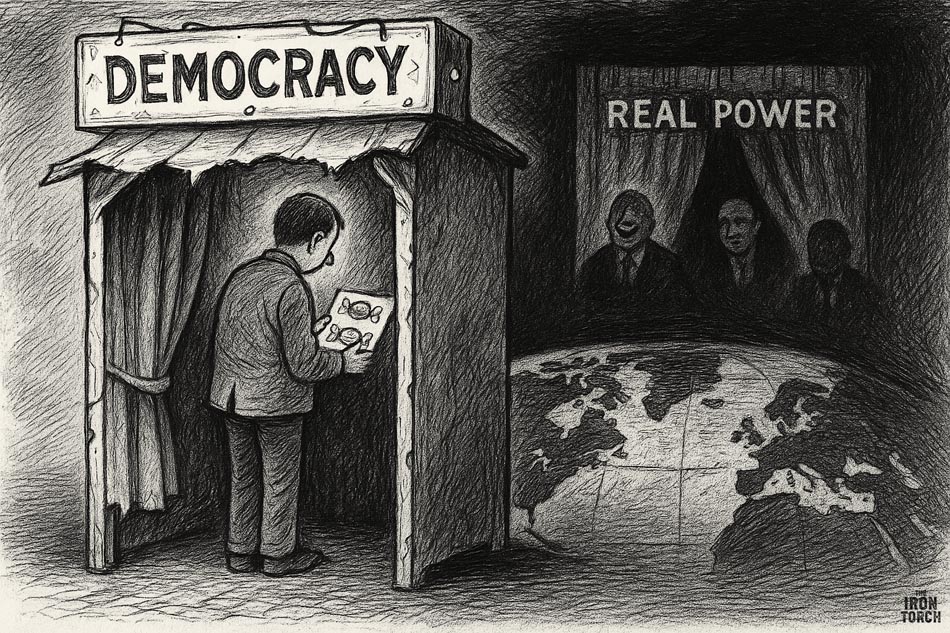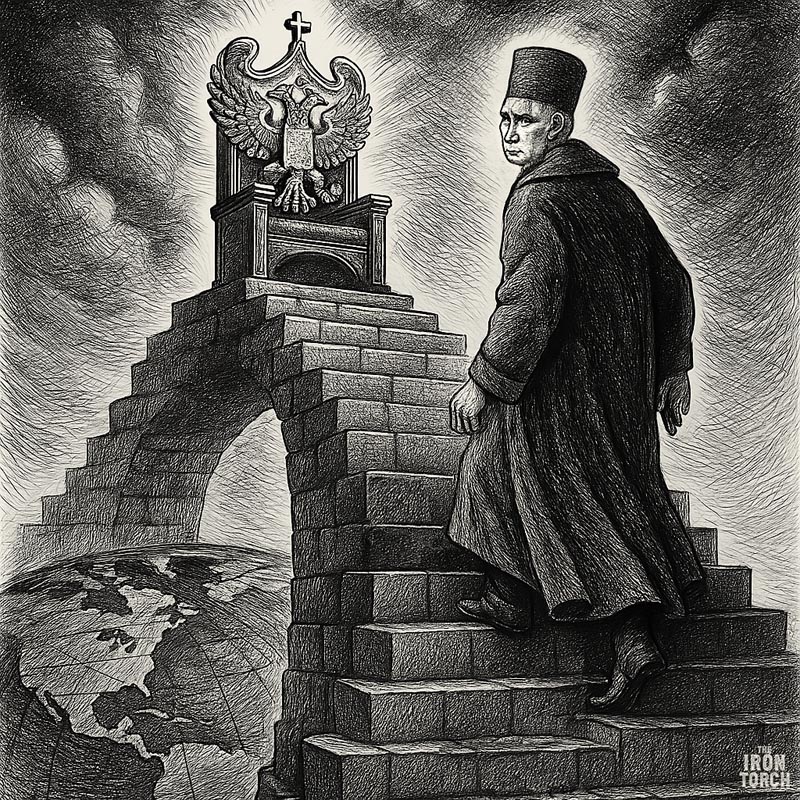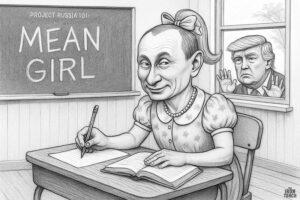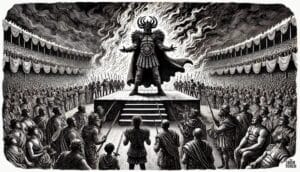Between 2005 and 2010, a mysterious series of books called “Project Russia” was distributed to Russia’s political elite. These weren’t ordinary books. They arrived via special courier reserved for top-secret government documents, delivered directly to the Kremlin, the FSB (Russia’s state security service), and other centers of Russian power.
No author was identified. No public announcements were made. Yet, within Russia’s corridors of power, these books became required reading.
When a commercial edition finally appeared in bookstores, it became a bestseller, read by over three million Russians. However, these books remain virtually unknown in the West, resulting in an alarming blind spot in our understanding of the ideology driving Putin’s Russia.
Why Americans Should Care About a Russian Book Series
You might wonder why a collection of Russian political texts matters to American democracy. The answer is both simple and terrifying: these books appear to be the blueprint for the ongoing assault on democratic institutions worldwide, including our own.
From election interference to the cultivation of extremist movements, from energy manipulation to the strategic amplification of social divisions, many of Russia’s actions over the past two decades align remarkably well with strategies outlined in Project Russia. Understanding this ideology is essential for recognizing and defending against threats to American democracy.
The Secret Doctrine Hiding in Plain Sight
“This work will split the world into two parts. The one that is right, wins.”
So begins the first volume of Project Russia, setting the tone for what follows—a manifesto that casts Russia’s conflict with the West as an existential battle for humanity’s future.
Only in 2010 did a Russian billionaire named Yuri Shalyganov step forward as one of Project Russia’s multiple authors. In an interview with the journal Communist Truth, he claimed that a secretive circle of influential elites wrote the books. Many experts speculate that the Kremlin itself commissioned the series.
Here’s the fascinating part: these obscure Russian texts offer something precious and rare—an unfiltered view into the mindset that drives Putin’s actions on the world stage. What Project Russia reveals is far more disturbing than most Western analyses suggest.
Core Theme: Democracy is a Myth and Must be Destroyed
The core message of Project Russia is shocking in its bluntness: democracy doesn’t work, has never worked, and needs to be destroyed.

“The candidates from both American parties do not differ from each other. All differences are laughable…If you call this choice, I am jealous of the power of your imagination.”Project Russia frames ordinary citizens as childlike, incapable of making informed decisions:
“National elections are reduced to outright stupidity because the people, like children, always prefer the candy wrappers, not the contents.”This contempt for democratic processes provides the ideological justification for Putin’s increasingly authoritarian rule. It also explains Russia’s systematic efforts to undermine democratic institutions worldwide.
The West as Mortal Enemy
Project Russia doesn’t stop at criticizing democracy. It paints the entire Western world as soulless and as Russia’s mortal enemy, and then claims that the enemy is winning.
According to the text, the West didn’t defeat the Soviet Union through military might but through a sinister campaign of cultural manipulation. Decadent Western powers supposedly replaced “the world view of the Soviet citizen” with consumer materialism, causing “deep ideological rifts” that ultimately led to the USSR’s collapse.
Project Russia goes on to assert that all of Russia’s current problems—corruption, declining birth rates, alcoholism, you name it—are the result of ongoing Western sabotage.
Even more ominously, Project Russia claims the West plans to eliminate what it calls the “superfluous” five billion people who aren’t part of the “golden billion” (the wealthy Western population).
This paranoid worldview helps explain why Putin sees Western support for democracy as an existential threat to Russia itself.
The Coming "Controlled Global Collapse"
Perhaps most chilling is Project Russia’s vision of the future: a “controlled global collapse” that will create opportunities for Russia to emerge as a dominant power.
“We believe that a new phase is coming in the development of human society. All will collapse—both Europe and America, and the U.S. dollar. It’s a matter of time,” Shalyganov declared.
This isn’t wishful thinking. It’s a long-term, strategic goal. Project Russia argues that Russia should actively work to destabilize Western democracies, accelerate their decline, and position itself to emerge as a global leader from the resulting chaos.
The books are surprisingly specific about tactics:
“We want to kill using social energy. Russia wants to destroy by manipulating the grievances and claims of the finely thinking elite… Therefore, only anti-social forces are effective against social forces. On the basis of this logic, our main task is to harness the power of protest.”
Remember, Project Russia was written years before the explosion of social media. It sounds almost prophetic now.
From Theory to Practice: The Evidence Mounts
If Project Russia were just the ravings of some fringe conspiracy theorists, we could laugh it off. But its prophecy is playing out, with the highest levels of the Russian government taking these ideas seriously.
Consider how closely Putin’s actual behavior matches the Project Russia playbook:
- Information warfare: Russia now operates what researchers call “troll factories,” churning out divisive content designed to polarize American society.
- Elite capture: Russian money has flowed to political parties and movements across Europe and America, potentially creating networks of influence.
- Energy manipulation: Russia has repeatedly used oil and gas supplies as political weapons, even funding environmental groups opposed to Western energy independence.
- Government infiltration: The books explicitly call for supporters to “get a job in government” and work within democratic systems to undermine them from the inside. Today’s Republican Party is more pro-Russian than ever before.
- Imperial Restoration: In Putin’s mind, reclaiming Ukraine—an aspiring democracy—restores “Russian greatness” and undoes the “tragedy” of the Soviet Union’s collapse.
The invasion of Ukraine, interference in American elections, energy weaponization, and support for extremist movements tightly align with the Project Russia ideology. It’s all part of a playbook we’ve been far too slow to confront.
How Project Russia Exploits America's Divides
Why has America had such a lackluster response? The apathy stems, in part, from a failure to grasp the true nature of the threat. The media rarely covers ideology—especially the kind that defies a quick soundbite—leaving it to independent outlets to inform the public.
Here’s what you need to know: According to Project Russia, information warfare should weaponize the internal conflicts of democracies and tear them apart from within. Like a puppeteer moving strings on marionettes, Russia can manipulate its targets by penetrating the culture and sowing seeds of chaos and influence. Sound familiar?

The U.S. has proven alarmingly vulnerable to this approach. The rise of Donald Trump is a case in point. From his 2016 campaign onward, he has benefited from Russian election interference, including email leaks, bot-driven disinformation, and social media manipulation. These tactics were not simply about influence; they were part of a broader Russian effort to seed division, delegitimize democracy, and elevate candidates aligned with Kremlin interests.
Furthermore, U.S. intelligence agencies have confirmed that Russia continues to boost politicians who will defund Ukraine, undercut NATO, erode institutional trust, and push isolationist policies that weaken the West’s collective strength. These efforts are amplified through algorithm-driven platforms like Facebook, X, TikTok, and Truth Social—each of which can rapidly spread manipulated narratives.
The result is a political battlefield in which American citizens, unknowingly, echo talking points engineered in Moscow. And authoritarian-aligned figures gain traction by exploiting grievances that Russia strategically inflames. What appears to be grassroots dissent is often carefully cultivated chaos.
Project Russia Comes to Washington

Nowhere has Russia’s strategy of subversion borne more fruit than at the top of the U.S. government, where it helped elevate the leader of the free world—and bend him to its authoritarian aims. Donald Trump has repeatedly expressed fawning admiration for Vladimir Putin, calling him a “genius,” “savvy,” and even “smarter” than American generals. But Trump’s relationship with Putin goes far beyond flattery—it reflects a deep alignment with Putin’s worldview and goals.
Trump’s policies—attacking democratic norms, sowing distrust in elections, isolating America from its allies, and vilifying the free press—closely mirror Project Russia’s prescriptions for destabilizing the West. The same is true for Trump’s cronies, who often echo Kremlin propaganda, from denying Russian war crimes to defending authoritarian rule under the guise of “presidential emergency powers.”
When we examine American politics through this lens, the patterns eerily align with a strategy spelled out years ago in books few Americans have even heard of.
The "Prince-Monk" and the Supranational State

So, what comes after the controlled collapse of worldwide democracy? Project Russia has an answer for that—a “supranational social system” led by “the one who has the most complete understanding of the world.” It then implicitly casts Vladimir Putin in the role of a “Prince-Monk” figure.
This new order would transcend national boundaries, uniting humanity under a single authority backed by a unifying belief system—a blend of Russian Orthodox values and other religious elements designed primarily for social control.
It’s a vision that’s part medieval monarchy, part modern dictatorship, and entirely megalomaniacal. Yet millions of Russians have read the book series and embrace this fantasy of Putin as humanity’s destined ruler.
Awareness Breeds Resistance
This supranational vision may sound extreme—even implausible—but it’s rooted in a carefully constructed ideological framework. And while the final act of Project Russia’s fantasy remains distant, the groundwork is already being laid. The playbook is less prophecy and more strategy, and parts of it are in motion.
By exploring this disturbing ideology, we can better recognize and counter the tactics designed to undermine our way of life. The first line of defense is always awareness, and Project Russia offers an alarming but essential window into the mind of one of democracy’s most determined opponents.
As Project Russia itself ominously declares:
“The aim of this work is to find people who will understand our message, then understand how it is implemented and will act according to the knowledge they have received.”
We would do well to understand that message too, not to implement it, but to prevent its vision from becoming our reality.
Further Reading: A Satirical Take on Project Russia

Want a lighter take on this deeply unsettling ideology? For those who prefer their geopolitical nightmares with a side of sarcasm, check out my other post, Inside Project Russia: Is Vladimir Putin the Ultimate Mean Girl? Because sometimes, to expose tyranny, you have to call out the cosplay czar for what he really is.
Sources and Additional Resources:
- Project Russia: The Bestselling Book Series of Putin’s Kremlin, South Central Review scholarly analysis by Lynn Corum (2018)
- The Wide Angle: “Project Russia,” Unknown in the West, Reveals Putin’s Playbook by Dave Troy (12/12/2024)
- Dave Troy Presents Podcast:




Pingback: Inside Project Russia: Is Vladimir Putin the Ultimate Mean Girl?